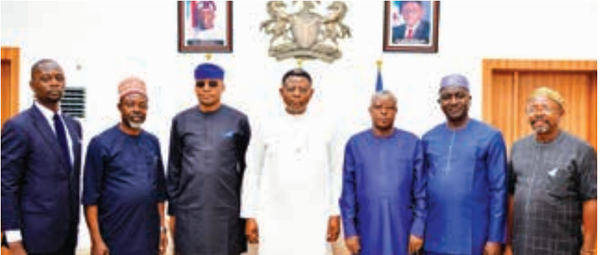Chat with the Commissioner for Establishments, Training and Pensions Chief Mrs. Lawrencia Ita

Good morning, Ma. Before you, are members of the Editorial Team of MOFINEWS Magazine who want to have a chat with you.
You are very much welcome to the Ministry of Establishments, Training and Pensions, where I, Chief Mrs. Lawrencia Ita is by the grace of God the Commissioner.
Commissioner Ma, we want to know, who Etieka Mrs Lawrencia Ita is?
I am a retired Permanent Secretary of the Cross River State Civil Service. I retired in the year 2015 from the Local Government Service Commission. After my retirement, the lots fell on me to be elected the Vice Chairman of Bakassi Local Government Council and at the end of that tenure, I found myself occupying this seat, all to the total Glory of God.
Congratulations, Ma. How did you receive the news of your appointment as Hon. Commissioner for Establishments, Training and Pensions.
Naturally, it came with excitement and I return all Glory, Honour and Majesty to my Creator, The Almighty God. I must confess that even though it came with excitement, it was with a shock because I was not looking forward to it. With all amounts of sincerity, this is the truth. Appointment and promotion, they say, do come from God. . I was so excited and pleased when I heard my name announced. Once again, I return all Glory, Honour and Majesty to the Almighty God and then to our Sweet Prince, the Executive Governor of Cross River State and his delectable wife for finding me worthy and fit for this position. Just like every human being would have felt, that was how I felt.
We know you come from a background where human resource management is given priority over the management of artifacts. What will be your advice to the government if the government decides to place embargo on staff promotions in order to conserve funds for the development of infrastructure?
Well, we all know that civil servants must be motivated and one of the vital instruments for motivating the civil servant is to give him or her his or her merited promotion as at when due. And if you want to get an efficient service you must motivate your workforce. So on that note, I will advice against the stoppage of promotion because staff must be motivated and then government can fi nd way and means of getting resources to manage the Service. Personally, I don't think I will support any ban on promotion.
In most cases, political considerations use to conflict with administrative and economic considerations in managing the affairs of the State. For example some years ago when the State government wanted to downsize the civil service in order to conserve funds for development, it had decided that those who had put in more than thirty years of service should be retired; but the International Labour Organization (ILO) Convention for which Nigeria was a co-signatory, had specified thirty five years of service. How will you handle a situation where political consideration conflicts with administrative or economic consideration if government were to downsize?
I pray the situation should not arise again because downsizing the workforce will bring about redundancy; so much of delinquency in the society and a lot of miscreants will be on the streets. Right now we have a teeming population of youths who have graduated from different Universities and they are roaming the streets; some have joined bad companies; some are into militancy; some are into kidnapping and all forms of vices in the society. So to advise government to downsize again will beef up this level, this high level of crime; the crime rate in the society will increase. Instead of downsizing the workforce, I will rather appeal for recruitment of the junior and middle cadre staff that are lacking in the system. Already the managerial cadre is very loaded. Come to think of it, on daily basis staff are retiring, so for now there is no need for downsizing. I am handling pension matters; I receive copious letters of retirement on daily basis; so for now there are vacancies to be filled.
Commissioner Ma, If the Commissioner is the political head of his or her Ministry and the Permanent Secretary is the administrative head of his or her Ministry, how will you ensure that there is no conflict of authority between them?
As you have rightly stated, it is a common knowledge that the Commissioner is the political head and the Permanent Secretary who has risen through the ranks and fi le to become Permanent Secretary is the administrative head. So, the line of demarcation is already there and with a harmonious working relationship, I don't think there should be any rancour. The administrative head is always on ground to handle the day to day running of the Service and giving sound pieces of advice to the political head and both, working in tandem with a common knowledge of what the goal of the service is, I mean that there are goals to achieve, there must be that good working relationship to enable us achieve that goal. In this my Ministry, I am in good working relationship, not only with my Permanent Secretary, but with other staff, especially, the Director of Administration who is also an administrative officer.
The State civil service which is coordinated by your Office is run under the line and staff organization method. If a situation arises where an administrative officer is on the same salary grade level with an officer in the executive cadre and both are working in the same Ministry, how do you decide who takes order from who among them?
That is an exciting question. But in the Service, the rules and regulations recognize the officer in the administrative cadre as being superior to the officer in the executive cadre. Come to think of it, why do officers in the executive cadre always want to transfer from the executive cadre to the administrative cadre? It is simply because they know that the administrative cadre is superior. So, I don't think there should be any confl ict. If you know the norms, the rules and regulations of the Service, you just adhere to it. There should be no conflict. Definitely, the administrative cadre is higher than the executive cadre.
Ma, There was what we call Staff List which contained the bio-data of staff in the top management cadre. I don't know whether you met it.
Yes, I met it.
Do you consider it necessary for your Ministry to re-introduce Staff List for proper guidance of the Service?
Candidly speaking, I will rather prefer record of service to be in place. Because in my days, at the entry point, every staff is meant and is still meant to have properly documented record of service which even serves the purpose more than the staff list. Record of Service documents your bio-data, everything and has to be updated as you progress in the Service. I will rather prefer that. When I came on board, I told my staff that we will send out circulars to ensure that every staff has his or her record of service documented and fi led in his or her personal file so I will rather prefer that.
Do you think that the current staff strength of the Civil Service is professionally representative enough for the Civil Service to be effective in discharging its functions in a democratic set up?
Thank you very much. I have already answered that question indirectly but let me amplify it. Like I earlier said, there is a need to recruit junior staff and the middle cadre staff. If that is done, I think it will help to enhance efficiency in the Service more than what is taking place right now because we lack enough staff in that cadre. Like I earlier said, the managerial cadre is loaded. We need more junior staff and the middle level staff to balance the equation. By so doing, we would then determine efficiency.
Thank you Hon. Commissioner, for granting us this interview.
Interview by Margaret Asikong and George Agbor



